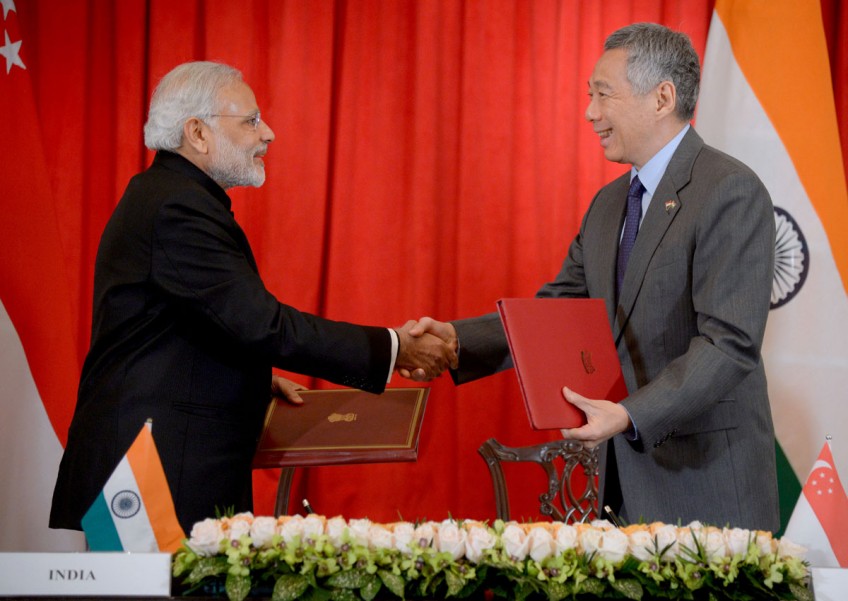S'pore, India deepen ties

Singapore and India laid out a road map for their future ties, elevating the relationship to a strategic partnership that seeks to promote a peaceful Asia Pacific region as an essential foundation for regional growth and development.
The partnership envisages political exchanges, enhanced defence and security co-operation, boosting trade and investment, enhanced financial linkages, strengthening air connectivity and co-operation in multilateral fora.
Offered to India first when then-Foreign Minister K. Shanmugam became one of the first world leaders to meet newly-elected Indian Prime Minister Narendra Modi last year, it is the high point of Mr Modi's two-day official visit to Singapore meant to celebrate 50 years of diplomatic ties. India was the second nation to recognise Singapore upon independence in 1965.
Earlier yesterday, the Indian leader was accorded a ceremonial welcome at the Istana as he arrived for calls on President Tony Tan Keng Yam, and meetings with Emeritus Senior Minister Goh Chok Tong and Prime Minister Lee Hsien Loong. Clad in grey, Mr Modi arrived to a light drizzle, which Indians consider a good augur.
Mr Lee also hosted lunch for Mr Modi, shortly after they witnessed the signing of nine bilateral documents and the launch of commemorative stamps to mark the 50th anniversary of bilateral relations.
A joint statement laid out a broad vision for the relationship's development, spanning defence to cultural and people to people exchanges. It also reaffirmed a shared commitment to maritime security and freedom of navigation, as well as safety of sea lanes in accordance with international law, such as the United Nations Convention on the Law of the Sea.
The strategic partnership will see regular high-level meetings at the level of defence ministers, the continuation of joint military exercises across all three service arms and collaboration in defence technology and co-production of weapons.
Also operationalised yesterday was a technical agreement on the sharing of so-called White Shipping Information between the two navies - information on movements of cargo ships - and a deal to co-operate in cyber security.
With Mr Modi pushing infrastructure and smart cities as a key plank of his development strategy, urban solutions - a key Singapore strength - has gained salience in the relationship.
The two sides agreed to enhance co-operation in sustainable smart city development with Mr Modi urging Singapore to explore the possibility of developing urban centres under the Smart Cities Initiative.
Another agreement on civil aviation will open opportunities for collaboration in development of Indian airports.
velloor@sph.com.sg
nilasen@sph.com.sg

Get MyPaper for more stories.